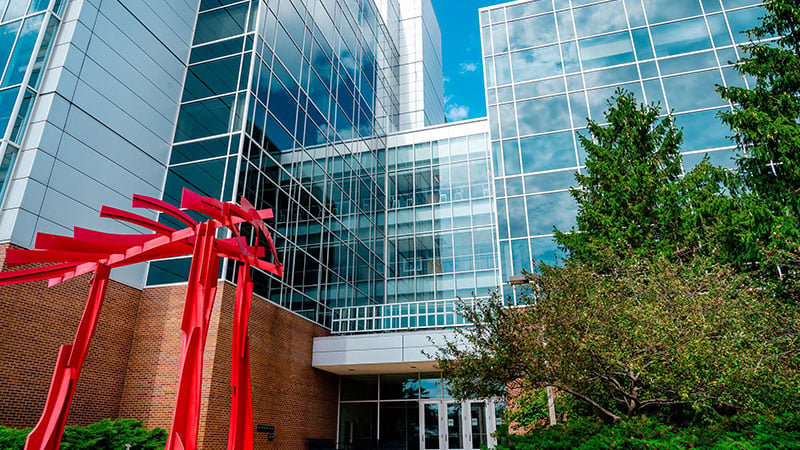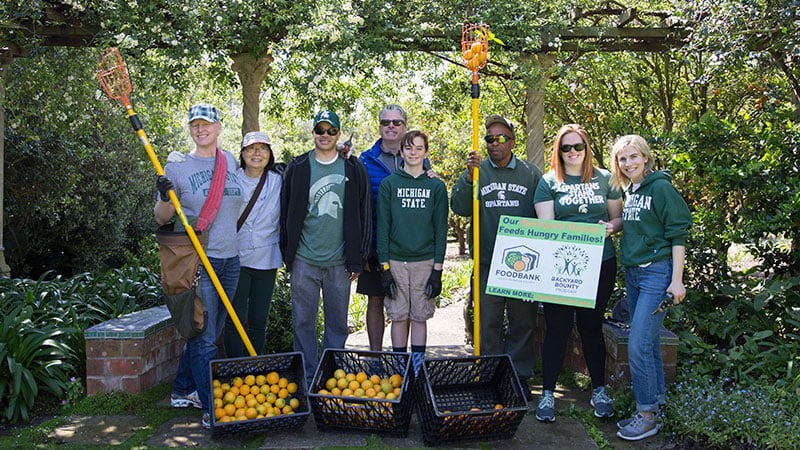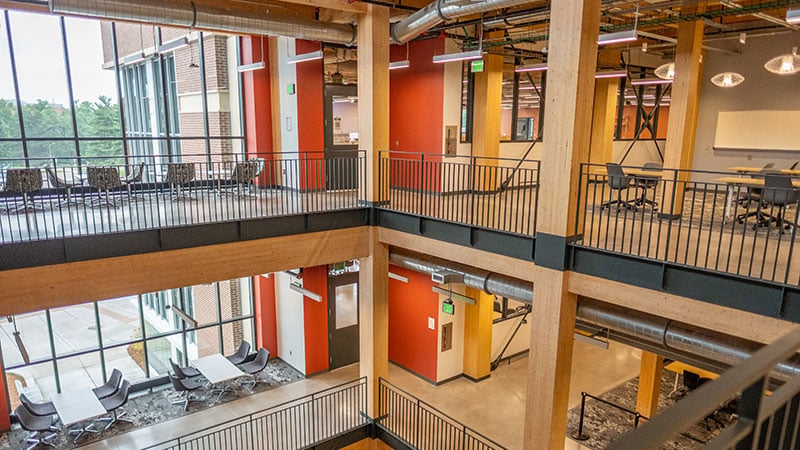Michigan State is working toward climate neutrality by mid-century, doing our part to address the global climate crisis within our own community and on our own campus. On this journey, we aim to reduce greenhouse gas emissions by 50% from our 2010 baseline, eliminating 292,934 metric tons of CO2.
To achieve our vision, we will be good stewards of resources and pursue initiatives in a manner that ensures our long-term sustainability and success. As we move into the next decade, with heightened competition for resources, declining federal and state support and concern about the cost of higher education, we must make focused and strategic use of our resources. We have a responsibility to use operational practices that reflect sound stewardship, efficiency and sustainability, while affirming that those efforts should not compromise the quality, safety or accessibility of our operations. We acknowledge also that we must do all we can within our means to deliver positive, supportive, engaging and enriching living, working, learning and recreational environments and experiences that our students, faculty and staff require to thrive and succeed and to continue to make MSU an attractive choice.
Our size and scope of activity are great strengths, but they can create operational silos that become barriers to the most effective deployment of resources. While respecting unique programmatic needs, we will leverage our collective institutional resources to support cross-institutional initiatives that advance our strategic priorities; reduce barriers to operational efficiency; and align the university’s fiscal, physical, technological and human resources to support our pursuit of excellence, advance equity and amplify our impact.
Engaged alumni, donors and friends are vital to our long-term sustainability. MSU is fortunate to have more than 1 million alumni, friends, corporations, foundations and organizations connected with the institution. These MSU ambassadors and supporters provide student internships and hire graduates, serve as guest speakers and advise on class projects, help recruit new students, serve their communities under the Spartan banner, and advocate across the globe for issues important to our students and the future of higher education and leading research universities.
Support from our alumni and friends is vital to staying at the forefront of excellence and crucially, it increases access to an MSU education. Alumni affinity and pride helps amplify and spread the Spartan story, engagement and volunteerism aids in student recruitment and enriches the educational experiences and professional prospects of students and graduates. Philanthropy endows professorships and funds student scholarships, supports state-of-the art facilities and enhances programmatic strength across academic disciplines and in important areas including libraries, the arts and athletics. As we embark on implementation of the strategic plan, we will enhance opportunities for alumni and friends to meaningfully engage with MSU and help provide the margin of excellence that continually increases the value of holding an MSU degree.
For many, athletics is their first experience with MSU and it is among the key drivers of alumni affinity with the university. Our visibility on the national stage through Spartan Athletics is an important part of the university’s identity—and equity—that requires thoughtful stewardship in a changing landscape. We will engage in comprehensive planning for the athletics department to fully support the academic and athletic success of our student-athletes, optimize and enhance revenue generation and improve the fan and community experience.
The world is ever-changing, and the pace of today’s change is exponential. To ensure a sustainable future and meet the needs of current and future students and stakeholders, we must continually and nimbly adapt and evolve, finding new ways to deliver education, conduct research and engage with communities and stakeholders across the globe. As a leading, global research university, our boundaries extend beyond our main physical location in East Lansing, Michigan, and beyond any physical boundary as we operate in increasingly digital, connected, virtual environments. Our size and reach require us not only to consider our institution’s long-term future, but also to actively lead the way in creating a sustainable, global future.
Although there is much work ahead, we begin with a strong foundation in place. Since the launch of a comprehensive energy transition plan in 2012, we have reduced greenhouse gas emissions by more than 30%, installed North America’s largest solar carport array, been recognized by the U.S. Department of Energy’s Better Building Program for achieving a 20% reduction in energy use in 20 million square feet of buildings and been recognized in the Times Higher Education 2021 Impact Rankings as a global leader in making progress toward the United Nations’ Sustainable Development Goals. MSU is well-positioned to lead, acting as a change agent to accelerate cross-sector climate response, serve as an important knowledge creator and convener, and educate the next generation of ethical and sustainability-conscious leaders.
Goal: Provide exemplary stewardship of institutional resources to foster the long-term sustainability of MSU and its high-quality education, research and outreach and engagement programs
Objective 1
Develop and implement a long-term, comprehensive financial model and budget process that aligns resources with strategic priorities; ensures university-wide effectiveness and efficiency; and sustains, expands and diversifies revenue sources
Strategies/Actions
- Transform the university’s budgeting process using an “all funds” approach to provide a financial management framework to support strategic priorities. Create and use unit-level financial dashboards that provide up-to-date data to support strategic decision-making
- Increase private support and launch the next comprehensive Capital Campaign
- Review and update the Spartan Athletics strategic plan in the context of the significant national evolution of collegiate athletics
- Pursue significant strategic external partnerships that support our mission, align with our values and expand our reach
- Integrate and streamline administrative systems and processes to gain efficiencies and improve the user experience
- Ensure ongoing examination of the portfolio of academic programs to best meet the evolving needs of prospective students and employers, expand our reach and diversify our student population
Objective 2
Create a new University Comprehensive Facilities and Land Use Plan that embeds diversity, equity and inclusion; faculty, staff and student success; and sustainable health in the physical environment of MSU’s campuses and facilities
Strategies/Actions
- Incorporate multiple perspectives into the planning process including consideration of the history of the land MSU occupies, tribal consultation around archeological sites and environmental impact reviews
- Ensure faculty, staff and students can live, work and learn in buildings and spaces that promote health and wellness, including incorporation of WELL building practices, proximal green space and pedestrian and bicycle-friendly design
- Coordinate and integrate with frameworks and plans for utilities, mobility and preservation and management of open spaces
- Incorporate campus “district” plans including collaboration/innovation zones throughout campus
- Plan for and construct/renovate high-priority facilities that support the MSU articulated priorities and values (e.g., multicultural center, recreational sports facilities, greenhouses, engineering facility)
- Ensure wayfinding is accessible for all users
- Enhance public art on campus and ensure it includes multiple modalities and diverse perspectives
Objective 3
Achieve climate neutrality by 2050 through technology innovation, fiscal stewardship and embedding sustainability into institutional culture
Strategies/Actions
- Develop an institutional Sustainability and Climate Action Plan using a four-pillar framework focused on: Campus, Curriculum, Community and Culture
- Foster resource stewardship through application of Leadership in Environmental Design (LEED) principles, organically managed land, reducing greenhouse gas emissions, increasing sustainable source purchases, increasing campus-grown and/or locally sourced food and reducing transportation carbon footprint
- Expand sustainability teaching and learning opportunities through formal courses and co-curricular activities
- Expand sustainability research and innovation through inter- and intra-institution partnerships to address climate solutions
- Enhance sustainability outreach and engagement by expanding volunteer opportunities for faculty, staff and students in support of local, state, regional, national and global partnerships
Objective 4
Develop a Sustainable Information Technology (IT) Strategic Plan to power the academic enterprise, Spartan innovation and sustainable business operations through enhanced access to information, operational technologies and strategic infrastructure
Strategies/Actions
- Improve and enhance IT services and infrastructure to improve access and reliability, and enable greater avenues for innovation in teaching, research and scholarly activity
- Expand access to technologies such as artificial intelligence, machine learning and augmented and virtual reality to enhance learning, research, community engagement and MSU’s reach
- Provide operational excellence by leveraging technology to provide informed decision-making, reduce operating costs and optimize the capabilities of our teams
Objective 5
Ensure faculty, staff, students and community members have access to MSU and its resources to address current and emerging issues that affect Michigan and the world
Strategies/Actions
- Ensure faculty, staff and students have the tools and network connectivity needed to succeed in remote, virtual and/or hybrid modalities
- Increase access for persons with disabilities
- Expand learning and applied learning opportunities through programs like micro-internships and stackable certificates
- Establish reciprocal opportunities for partnering with businesses and community organizations to enhance each other’s work
- In partnership with Detroit stakeholders, identify and implement a strategic framework to guide education, scholarly and outreach activities in Detroit to promote advancement of social and economic impacts in the state’s largest city
Stewardship and Sustainability: Illustrative Indicators/Metrics
- By 2030, reduce greenhouse gas emissions by 50% from 2010 baseline (cut by 292,934 metric tons of CO2)
- By July 1, 2022, develop clear guidelines that align resources with strategic priorities
- Increase nontuition and nonstate appropriations revenue by 20% by 2026
- Complete the University Comprehensive Facilities and Land Use Plan by the end of 2022
- Achieve platinum ranking in the Sustainability Tracking Assessment and Rating System (STARS) by 2030
- Achieve top 100 Times Higher Education Global Impact ranking by 2030
- Enterprise-level resources from the SMART campus technologies sector (increase)
- Colleges with outreach and engagement and engaged scholarship integrated into college unit missions and strategic plans (100% by 2025)
Engaged Alumni and Friends
Michigan State has created diverse opportunities for alumni and friends to meaningfully engage with the university.
STEM Facilities
One of MSU’s strengths as a Big Ten research institution is offering undergraduates unmatched academic experiences, and our newest academic facility delivers on this promise as well as on our commitment to sustainable growth.


